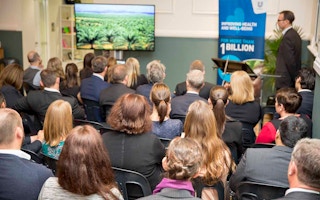There is a strong economic case for companies to ensure that their businesses are socially and environmentally responsible, said business and civil society leaders in Sydney last Thursday, and Australia’s future prosperity depends on how sustainable and inclusive its economy is, they observed.
Pulling off this massive but essential transition will require closer collaboration between companies, non-governmental organisations, policymakers and academics, said industry experts speaking at a panel discussion organised by Anglo-Dutch consumer goods giant Unilever on achieving the United Nations’ Sustainable Development Goals (SDGs).
The SDGs are a set of 17 goals which aim to end poverty, protect the environment, and achieve inclusive economic growth for all. The universal objectives, which will guide global development efforts till 2030, were adopted last September and took effect at the beginning this year.
Clive Stiff, chief executive officer of Unilever Australia and New Zealand, said that in the company’s experience, “there is no trade-off between profitable business growth and sustainability”.
In fact, it is a strategy that appeals to increasingly conscious consumers and creates real value for businesses, he told the audience of 47 attendees at The Ethics Centre, a non-profit organisation focused on ethical issues.
He added: “Many Australian businesses are also taking a lead and recognising the economic case for action on key social and environmental issues”.
At the event, which also marked the mid-term mark of Unilever’s 10-year Sustainable Living Plan, Stiff noted that the company is committed to achieving the SDGs, and this is evident in its targets.
Unilever’s Sustainable Living Plan was first launched in 2010 and sets out to improve the well-being of more than a billion people, halve the environmental impact of its products and enhance millions of livelihoods by 2020.
The company said it was on track to deliver the “vast majority” of its targets.
It has successfully reached about 482 million people through its initiatives to improve health and well-being. The company also reports good progress on its contribution to economic and social well-being worldwide.
For example, it published its first human rights report last year and trained almost 20,000 people on tackling issues such as human rights violations and sexual harassment.
In Australia and New Zealand, it also reported good progress towards creating a gender-balanced and inclusive organisation by 2020. About 55 per cent of Unilever Australia and New Zealand’s staff as of the end of 2015 was female and 46 per cent of all senior managers were women.
When it comes to the goal of halving its environmental impact, however, the company reports mixed progress.
The positive news is that it has managed to ensure that 60 per cent of its agricultural raw materials are sustainable and can trace back all the palm oil used in its European and Australian food businesses to certified sustainable plantations.
It has also managed to reduce the emissions used to power its manufacturing operations by 39 per cent per tonne of production since 2008, and reports that its factories last year drew 19 million fewer cubic metres of water than they did in 2008. That is a 37 per cent reduction in water use per tonne of production.
“
Many Australian businesses are also taking a lead and recognising the economic case for action on key social and environmental issues
Clive Stiff, chief executive officer, Unilever Australia and New Zealand
Unilever Australia’s offices, warehouses and factories also now send zero non-hazardous waste to the landfill, and the company has helped divert some 1,200 tonnes of soft plastic packaging — which cannot be recycled in traditional plants — from landfills through a partnership with Australian recycling innovation project RedCycle.
However, Unilever struggles to reduce the overall life cycle of its products, including consumer use. The emissions from product cycles have increased by 6 per cent since 2010, and the company says it will continue looking for innovative ways to help people reduce their environmental impact.
Ultimately, “the changes needed to deliver the SDGs stretch way beyond Unilever or any single company, government, or NGO,” said Stiff.
This is why Unilever has been instrumental in forming the Global Commission on Business and Sustainable Development, an international initiative which was launched this January and aims to accelerate the shift towards a more sustainable economy.
The Commission will deliver an initial report which will present an economic case for mainstreaming sustainable development in January next year, and the points shared at last week’s panel discussion would feed into this global report.
Other Australian sustainability experts at the event also shared ways that business can benefit by delivering on five key SDGs, namely gender equality, life on land, climate change, responsible consumption, and partnerships.
For example, John Conner, chief executive officer of climate think tank The Climate Institute, said that “businesses should use their individual and collective voice to explain the benefits and common ground in tackling climate change”.
“They should support good policy development and highlight the costs of inaction as well as demonstrate transparency and work collectively with their supply chains to help make it happen,” he added.
And when it comes to fostering the collaborations that are essential to achieving the SDGs, Trent Moy, senior consultant at The Ethics Centre, said that businesses can take a range of actions including creating more visibility around existing partnerships, and taking the competitiveness out of partnerships.
The latter would involve “allowing business to politely steal from each other where it is beneficial to society,” said Moy.
Ultimately, he noted, “we need to re-think how we partner”.

















